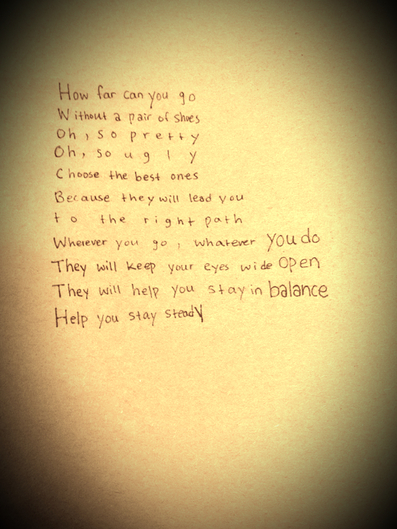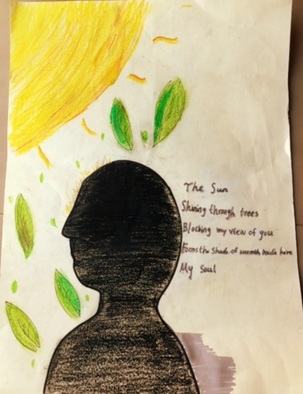I think what Mr.Keating was trying to say is to remember that all people have different perceptions. It's important to use that wisely. I think I can relate to this movie called Easy A. It's about a teenager who is always proud of herself and careless about her rumors. Like her, I started to think that what others think about me didn't matter; people who I think are important in my life are the ones who i should really care about. I felt bad when others didn't know me that well started spreading rumors about me, but when I changed my mindset, I realized that they didn't really affect me in any ways. Mr. Keating said "don't just consider what the author thinks, consider what you think". I tried to accept and embrace. Once I started doing that, things got much better. Also, I really think his idea of making his students stand up on their desks to show them how they can look at the classroom in a different way, was fun and unique. Who would ever have a chance of doing that? I think those kinds of unexpectedness make students be more open-minded. Everytime my teachers came up with different methods of teaching us, I always felt excited, no matter what it was about. Mr. Keating mentioned that our opinions and thoughts are important too and i think that makes me feel like i have less strss to deal with and feel more free, and more confident about what i think, even though I know it's wrong.
I think The Dead Poets Society was a pretty good movie, showing us how poetry can help people see the world in different ways. And Mr. Keating, the new English teacher, influenced his students a lot, leading them differently. This made his students realize what’s more important in their lives, like being able to do things they want to. I like how he earned their respect by being friendly and honest. But it also made me feel sympathy for Mr. Keating because of how other teachers, parents, and students were against his teaching methods, beliefs, and ideas. It’s also sad how the society we’re in is still like that. I think what Mr. Keating did was wise because he was once a student at Welton Academy so he has more experiences. He let them free most of the time, and gave them time to think in creative ways. I was able to relate to the movie, especially the relationship between Neil and his parents. My parents aren’t usually like that but I have a friend who has very strict parents. She also wants to be an actress but her parents want her to be a doctor. I never thought that those kinds of relationships could be stressful but now I kind of understand. But I don’t like how Neil dealt with his problems throughout the movie; I personally think he should’ve been more straightforward. I think Neil felt a little better because he took Mr. Keating’s advice.
This poem has a rhyme scheme and uses imagery, for example, his lips are
pale and still. I think this poem was written in respect to someone. He sounds very pleased and hopeful. He mentions the death of his captain but I don't exactly know what that's supposed to mean. However, the poem doesn't sound so depressing because of the way he describes it. It's weird but the poet sounds excited and cheerful when he's not supposed to. I think the poet has rather gone mad because he's too upset. I also feel like the mood of the poem did not change throughout the entire poem. The way the poet reassures the dead captain made me feel confused. Because the poet is glad that their fearful trip is over but it seems like he's really shocked that his captain's dead. It's kind of like a mix of feelings/emotions which I find it interesting. I think this quote/poem reflects Mr. Keating, the poet’s personality and thoughts. I feel like he has his own style of expressing his ideas. When he was saying to the students, it just grabbed their attention. I think the reason why they were interesting is because he was different from other teachers. (He calls himself a free thinker.) This quote/poem is really meaningful in my opinion. It gives reasons why we need poems and I greatly agree with it. It seems so true and seems like it doesn’t need any more explanation. The poem made me think that the poet has strong beliefs and is a really passionate person. This made me think about poems again, like what they exist for and what’s so important about them. I like how the quote/poem itself has no boundaries (no racism, no sexism, etc.); it’s for the free minded.
I think Spring Comes to Murray Hill is a light, cheerful poem that anyone can agree on. I like his choice of words and how he made it so fun to read. Also, its meaning is pretty clear. I think it’s a really good idea to compare his feelings to other things because it’s really descriptive. It’s about a New Yorker who is over-stressed at work. It’s kind of sad how he wants to enjoy the weather, relax and have fun but his work’s stopping him. I think he’s saying that he feels a little different because spring came. Spring might mean a lot to him and it’s the season of new beginnings. He sounds hopeful, expecting changes in life.
I think the author’s trying to relate life to river. For example, he described the river in a good way but also how things can go wrong, which also gives us a little hint about his life experiences. The author says that he’s seen the end of the river and how it died. This tells me that he had difficult times in his life. He also said that the river is unanswerable. Many things are unanswerable and the author means that he’s just walking along the flow (because rivers can symbolize the flow our lives). This might be because he believes in certain things or he may be too dependent on something. In the beginning, he described how amazing and great the river (or life) is and how he has too many reasons to love being alive. And he continues talking about the ups and downs in life. I think this poem makes me feel relaxed and I find it easy to relate to.
I remember
aftr several days had passed rough winds blowing so hard cold as snowman, warm as fireplace just a touch of sparkle Now it's darkness full of hope and expectations something breaks the silence mom's voice is so faint, just whispers Where's the old man in red? Socks and hairbands perhaps he never existed now it strikes me so hard guess she couldn't find my letter i wrote before this gloomy night 1.Alliteration: use of repeated consonants or stresses syllables, especially at the beginning of words.
E.g." Five miles meandering with a mazy motion." 2.Allusion: figure of speech that makes a reference to a place,person, or something that happened. E.g. "The girl's love of sweets was her Achilles heel." 3.Figurative language: describing something by comparing it with something else. E.g. "Alright, the sky misses the sun at night. " 4.Free verse: poetry that does noy rhyme or have a regular meter. E.g. "I can't believe I'm so high feeling like a queen I stretch my arms out to the sides " 5.Hyperbole: Exaggerated statements or claims not meant to be taken literally. E.g. "I've told you a million times" 6. Imagery: appealing to the senses. E.g. "Rough winds do shake the darling buds of May" 7.Lyric: a short poem of songlike quality. E.g. "Shall I compare thee to a summer's day" 8.Metaphor: figure of speech that describes a subject by asserting that it is, on some point of comparison. E.g. "The streets were a furnace The sun an executioner" 9. Mood: overall feeling of the poem, this can be created by the tone or by the language choicesof the poem. E.g. "I'm sick Not pain filled headache sick" 10 Onomatopoeia: The formation of a word from a sound associated with what is named. E.g. "I heard the ripple washing in the reeds" 11.Oxymoron: a multiple part word or phrase that contradicts its self. E.g. "Ralph, if you're gonna be a phony You might as well be a real phony" 12. Paradox: A seemingly contradictory statement that may nonetheless be true. E.g. "I'm a compulsive liar Do you believe them or not?" 13.Personification: inanimate objects or abstractions are endowed with human qualities or are represented as posessing human form. E.g. "The wind stood up and gave a shout" 14. Repition: an instance of using a word, phrase, or clause more than once in a short passage. E.g." When parrots do it It's parrotting" 15.Rhyme Scheme: identify or close similarity of sound between accented syllables. E.g. "Whose woods these are I think i know His house is in the village though" 16.Rhythm: the sense of movement in speech, marked by the stress, timing, and quantity of syllables. E.g. "When the dog bites When the bee stings" 17.Simile: two fundamentally unlike things are explicitly compared, usully in a phrase introduced by like or as. E.g. She dealt with moral problems as a clear deals with meat" 18.Stanza: A group of lines forming the basic recurring metrical unit in a poem. E.g. "Blah Blah Blah Blah blah blah" 19.Symbol: something that represents something else by association, resemblance, or convention. E.g. "We sew,sew,prick out fingers dull out sight, producing what? A pair of slippers, sir, to put on when you're weary." 20.Tone: The attitude of an author. E.g. "Goddam money. It always ends up making you blue as hell" 21.Understatement: A disclosure of statement that is less than complete. E.g. "Some say the world will end in fire. Some say in ice. From what I've tasted of desire I hold with those who favor fire. But if it had to perish twice, I think I know enough of hate To say that for destruction ice Is also great And would suffice. |


 RSS Feed
RSS Feed